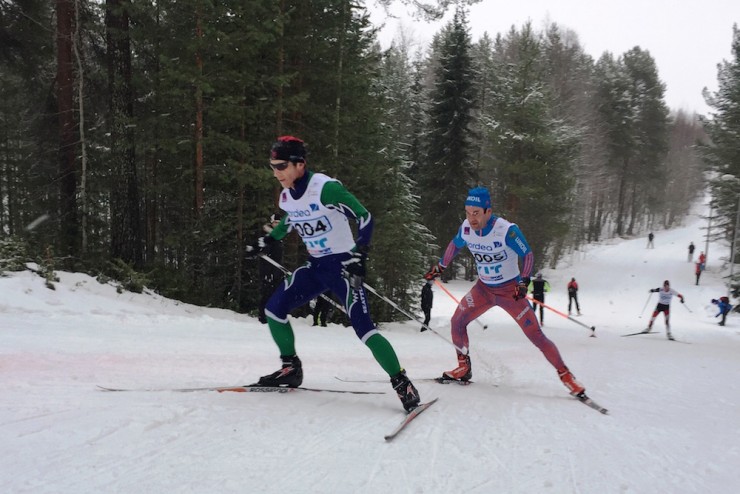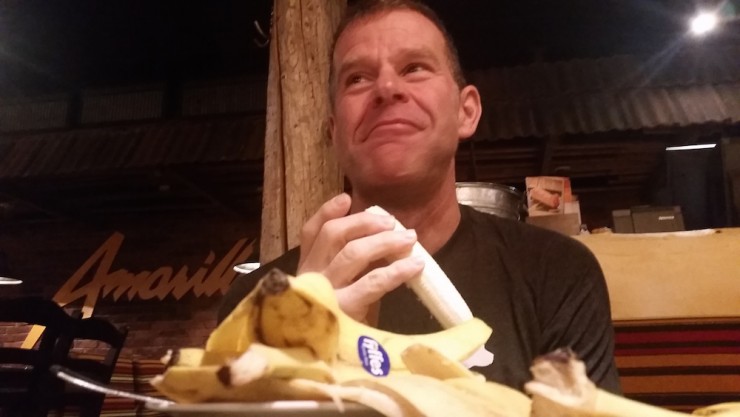
Hankering for World Cup-style distance racing?
While most masters tend to aim for the traditional ski marathons, the annual Masters World Cup (MWC) presents an opportunity for skiers 30 and older to ski up to four races of regular World Cup distances in a week.
“It’s so much fun to do a variety of distances within a week, and being able to battle it out with athletes from all over the world is just a really unique opportunity,” says Milan Baic of Traverse City, Mich., who won silver in the final 45-kilometer skate race on Feb. 12 in Vuokatti, Finland.
Baic, 56, has been to every MWC event since 2004, and is planning to be back at the 2017 MWC in Klosters, Switzerland, and beyond.
“With the MWC you get a package deal of a race week. It’s not just a week of really professional and high-level racing,” Baic says. “But AXCS [American XC Skiers] puts together everything with accommodations, race entries and all logistics taken care of, all in a very affordable package. It’s a great value. All you need to do is show up and race.”
More than just races
“You meet so many interesting people, you make genuine friends that you see year after year at the Worlds, and you start looking at people from other countries and cultures in a different way,” Baic says.
He notes that while every year has a different flavor and atmosphere, the events in Russia in 2004 and 2015 have been among the most memorable.
“People in the host communities really take a lot of pride in putting on a really professional and smooth championship week, and are also really excited to share their culture and specialties in everything from opening and closing ceremonies, award ceremonies, medals and awards,” he says.

Also, Baic points out that the U.S. contingent also has a great spirit, good energy and a supportive team environment.
“The racers cheer for each other, help each other out with feeds and wax tips, and it’s fun to travel with the same people, as well as meet new skiers from other parts of the U.S.,” Baic says.
Baic and several of the masters on the US team train systematically for cross-country skiing year-round. He estimates that in an average week, he puts in about 12 hours of training between skiing, strength training and occasional cross training.
While the MWC is the highlight of the season, Baic also races the traditional marathons, and last year, he was 43rd at the American Birkebeiner, the highest ranked to date of any racer 50 or older in the 43-year-old event.
This is the Masters World Cup
Every year, the International Ski Federation (FIS) and the World Masters Association (which is currently under the reign of the first-ever American president, John “JD” Downing) organize a championship-style weeklong competition open to non-professional skiers age 30 and older. The event routinely attracts over 1,000 skiers from more than two dozen countries. This year, the masters World Cup was held in Vuokatti from February 6-12. Roughly 70 American skiers age 40 to over 80 helped themselves to 16 medals in the course of the week in Finland.
If the venue Vuokatti sounds familiar, it might be because it is also home to both FIS World Cup and Continental Cup races every year, as well as one of Finland’s Olympic training centers, home to the 2-kilometer Finnish ski tunnel, and the Angry Birds theme park.
What’s next
The 2017 Masters World Cup will be held in Klosters from March 2-11. .
Then, in 2018, the Masters World Cup returns to North America for the first time since 2011, back when the event was held in Silver Star, British Columbia. The 2018 championships will be held in Minneapolis in January 2018, but the exact dates are yet to be announced.
The Minneapolis Masters World Cup represents a very unique opportunity to race several World Cup-style races right in the heart of a big metropolitan area, as most of the Masters World Cup events take place at ski areas that are not necessarily close to big cities.
2016 Masters World Cup results
About the Author: FasterSkier contributor Inge Scheve, a Norwegian native, lived in Fairbanks, Alaska, and Bend, Ore., for a number of years where she became an avid skier and masters racer. Scheve recently competed in her sixth Masters World Cup in Vuokatti, Finland.
Inge Scheve
Inge is FasterSkier's international reporter, born and bred in Norway. A cross-country ski racer and mountain runner, she also dabbles on two wheels in the offseason. If it's steep and long, she loves it. Follow her on Twitter: @IngeScheve.



